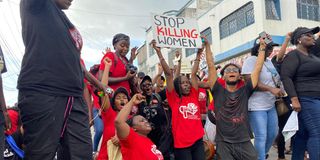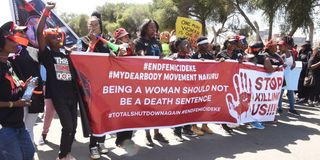‘Stop killing us’: Protests across Kenya over the rise of femicide

Women in Nairobi take part in a protest dubbed 'Feminist march against femicide' on January 27, 2024, to protest against the rising femicide across the country in recent months.
Kenyans from 10 counties woke up on Saturday to peaceful protests against the rising cases of femicide in the country.
Leaders, feminists and activists demanded action to stop the killings during the peaceful protests held in Nairobi, Mombasa, Kisumu, Nakuru, Eldoret, Homa Bay, Turkana, Kilifi, Machakos and Kisii.
Similar street protests took place in Nyeri County on Friday.
The protests were sparked by the murder of 16 women in a month, most of them by an intimate partner.
In Nairobi, thousands of women took part in the march against femicide in Kenya. Led by lobbies working to eradicate sexual and gender-based violence, activists demanded respect for the sanctity of women's lives.
The protesters demanded that their safety be guaranteed in all the places they visited. Carrying placards, the demonstrators blocked some of the city's roads to express their anger and call on the authorities to turn the tide against the killings.
And Nairobi's women's representative, Esther Passaris, found herself in hot soup as protesters heckled and booed her.
Undeterred, Ms Passaris braved the hostile crowd to call for a review of laws that make gender-based sexual offences non-bailable.
"People feel they can get away with it and not be jailed because there is no price to pay. If the evidence is clear, perpetrators should not be released on bail," Ms Passaris said.
Amina Siyad, Garissa County women's representative, questioned why First Lady Rachel Ruto was absent at a time when women were being killed.
In Mombasa, the groups marched from Mapembeni to Tonononoka grounds where they issued an urgent call to end femicide.
Speaking before the start of the march, the activists urged the government to come up with effective laws and policies to stop the killing of women.
"We are deeply saddened by the spate of killings of women. Since December, more than 16 cases have been recorded in the coastal region alone, with women being killed in horrific scenarios. Why isn't the government taking decisive action to address this problem?" asked Salma Hemed of HAKI Africa, a human rights organisation.

Women in Nairobi take part in a procession called the 'Feminist March Against Femicide' on January 27, 2024, to protest against rising femicide in the country.
Maureen Magaga of Lend a Voice Africa said it was becoming increasingly unsafe for women in Kenya and called on the government to come up with a comprehensive plan to combat femicide.

Mombasa residents in a procession on January 27, 2024 to protest against the prevalence of femicide in the country.
"We demand that the government prioritise the fight against femicide, establish a comprehensive data collection system for unreported cases and form a commission with a clear plan to address these killings. We stand united to defend our right to live as women.
In Eldoret, a group of men who joined the national anti-femicide protest spoke out against the killing of women for failing to show up for dates, even after being arranged by men.
Commercial sex workers from Eldoret who joined the protest said they had lost their colleagues to femicide on several occasions.

Anti-femicide protesters march in the streets of Eldoret town, Uasin Gishu County, on January 27, 2024.
"For a long time, our colleagues have been victims of femicide, but we find it difficult to come out and fight for their rights because our business has been declared illegal in our country," said one of the commercial sex workers in Eldoret.
In Lodwar, hundreds of residents took to the streets to march against the alarming rise in femicide cases in the country. They held placards with various messages, including: 'Being a woman should not be a death sentence! 'End femicide in Kenya now', 'Our lives matter - stop femicide' and 'Why do you hate us?
The march from Lodwar Islamic Centre to the County Commissioner's office was joined by feminists and activists, men and women.

Lodwar residents march during anti-femicide protests on January 27, 2024.
Turkana Central Deputy County Commissioner Siele Kipng'eno received a petition from the protesters. In the petition, the demonstrators called for strict laws and penalties for perpetrators of femicide and improved law enforcement in cases of violence against women.
"Such protests are part of increased public awareness and education on gender-based violence. As security stakeholders, we will ensure that no resident is deliberately killed because of their gender. We promise to deal with all perpetrators according to the law," said Mr Kipng'eno.
In Nakuru, more than 200 men and women gathered at the railway premises and walked through Kenyatta Avenue to the KFA roundabout to protest against the killings of women.

Women and human rights activists hold a peaceful protest along Kenyatta Avenue in Nakuru City against femicide in the country.
"We are here to demand justice for all the women who have died mysteriously at the hands of men and we also demand safety for women. It seems that it is still acceptable to kill women and girls whenever you feel like it. And today we say no more. You will no longer kill us and get away with it," lamented human rights defender Hassan Adeko.
In Homa Bay, Bishop Teresa Korinda of Jemi Hope Ministry said love triangles and the influence of social media were the main reasons why women fall into murder traps.
"Couples should be ready to seek guidance from spiritual leaders when faced with domestic problems," she added.
- Reporting by Wangu Kanuri, Jurgen Nambeka, George Odiwuor, Mercy Koskei, Titus Ominde, and Sammy Lutta.





